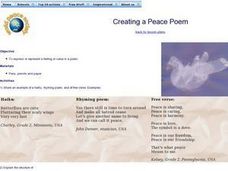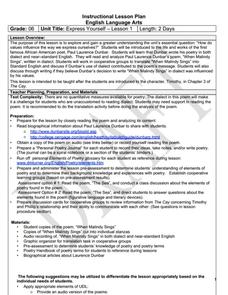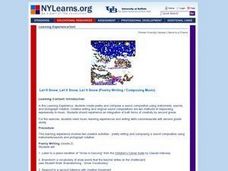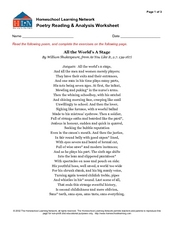Curated OER
Biographical Poems
Students write a biographical poem about themselves. They observe a teacher-led demonstration, write an autobiographical poem and a biographical poem about a famous person using a template form, and display the poems side-by-side.
Curated OER
Found Poem Worksheet
If you're teaching your class about the cycle of life and want to include a poetry element, consider this exercise. It provides a link to a Found Poem (a poem created from others' words, but an original idea) that includes words...
Curated OER
Skill Building: Alphabet Poem
Amateur poets explore alphabetical poetry. They choose a topic and brainstorm vocabulary that relates to the topic using each letter of the alphabet. The class then generates ideas for a group alphabet poem. After creating one as a whole...
Curated OER
Creating a Peace Poem
Second graders write a poem using words from a list and practice poetic forms. In this lesson on writing a peace poem, 2nd graders brainstorm words or phrases associated with "peace." Students choose a poetic form to express their...
Curated OER
Poems: Identifying Patterns
Here is a great worksheet that contains two short poems to compare and contrast. Children will read each poem out loud and then complete three comparative analysis questions which focus on rhyme, structure, and language. Note: The...
Georgia Department of Education
Exploring Poetry and Poets
Combine the study of poetry and non-fiction texts with this complete and ready-to-use six-week unit. After reading numerous poems from local writers and compiling a personal anthology, high schoolers find and read a memoir or biography...
Curated OER
Poems: calligrams
Have fun with shape poems! First and second graders write calligrams that add to the meaning of their poems. Great for your poetry unit or if you want to combine poetry and art lessons.
Curated OER
6th Grade: Express Yourself, Lesson 1: Poem
While originally created to accompany The Cay, this poetry lesson could be used on it's own, especially if you are working on dialect. Class members conduct a close reading of "When Malindy Sings" by Paul Laurence Dunbar and listen to an...
Hong Kong Special Administrative Region
Learning English through Poems and Songs
Exposing learners to the power of words in poetry is a stimulating way to learn languages. Songs, haikus, rhyming words, and narrative works are all employed in a resource for teaching English as a Second Language.
National Council of Teachers of English
A Bear of a Poem: Composing and Performing Found Poetry
Scholars work collaboratively to compose a found poem from one of their favorite stories. With a finished product in hand, class members form a circle and perform their work for an audience by taking turns reciting one line till the poem...
National Council of Teachers of English
Writing Acrostic Poems with Thematically Related Texts in the Content Areas
Scholars scour thematically aligned texts to gather a bank of words they can use in an original acrostic poem.
Curated OER
Set a Poem to Music
Fun awaits both you and your class as you embark on a musical activity. After discussing different rhythmic meters they choose a poem to set to music. The poem must rhyme and be set to a melody in the key of C Major. Because the activity...
Pulitzer Center
"Voices from Haiti": Using Poetry to Speak up for a Cause
Explore a real world use of poetry with your class! Young language arts pupils consider the concept of advocacy and how journalism, photography, and poetry can raise awareness for a cause. They read several poems about individuals...
Curated OER
Japanese Poetry: Tanka? You're Welcome!
Students explore tanka, a form of Japanese poetry. They read and analyze tankas to determine the structure and intent, and compose a traditional and a non-traditional tanka.
Curated OER
Poetry/Music: Let It Snow!
Learners create poems and sound compositions using instruments, sounds, and pictograph notation. After listening Debussy's Children's corner suite, they brainstorm a list of snow vocabulary words. Students write poems and in groups...
Curated OER
Poetry Writing Unit: Writing a Film Poem
Film poems? To concluded a poetry unit, writers select one of their own poems and create a film that brings to life the sounds and images of their work. Included with the detailed unit plan are daily lessons, student examples, a list of...
Curated OER
Acoustic Poems
Students explore acrostic poems. In this interactive poetry activity, students visit the ReadWriteThink.org website to view characteristics and samples of acrostic poems. Students develop acrostic poems by using the interactive site.
Curated OER
Writing a Shape Poem
Shape poems can be fun! Give your writers this example of a poem shaped like a fir tree, then give them the chance to try one of their own. This can be a fun poetry-style exercise to let visual learners experience a new side of poetry.
EngageNY
Gathering Evidence and Drafting a Two-Voice Poem (Chapter 13: "Los Duraznos/Peaches")
Begin class with a short comprehension quiz and review and then move into a new genre: two-voice poems. The activity provides information about this type of poetry as well as a video example made by eighth graders that you can show your...
Macmillan Education
Understanding Poetry (Elementary)
Introduce young readers to poetry analysis with a worksheet that uses Emily Bronte's "Spellbound" to model how poets use word choice, the sounds of words, the repetition of words, and rhyming patterns to create the mood, tone, and...
Curated OER
A Sad Song about Greenwich Village: Poetry Analysis
This is a nice worksheet for beginner poetry explicators. The poem, "A Sad Song about Greenwich Village" provides the avenue for exploring rhyme, paraphrasing, interesting diction, description, main idea, and title.
Curated OER
Poetry Reading and Analysis Worksheet - As You Like It
Enhance your lesson on Shakespeare with this poetry activity. After reading lines 139-167 from As You Like It Act II, Scene 7 (provided on the first page), middle schoolers work on a graphic organizer to paraphrase each part of the poem....
EngageNY
Writing, Critique, and Revising: Two-Voice Poems (Chapter 14: "Las Ucas/Grapes")
Continue work on the two-piece poem that compares two characters from Esperanza Rising. Give class members a few minutes to finish their drafts. After they have a complete product, model how to critique and edit the poems with one group....
National Council of Teachers of English
Writing Poetry with Rebus and Rhyme
Young scholars write rhyming poems using rebus. With pictures instead of words, authors create original work about things they love.
Other popular searches
- Poetry Analysis
- Poetry Alliteration Examples
- Poetry Alliteration
- Writing Poetry
- Concrete Poetry
- Poetry Unit
- Introduction to Poetry
- Poetry Lesson Plans
- African American Poetry
- Figurative Language Poetry
- Free Verse Poetry
- 6th Grade Poetry Unit

























